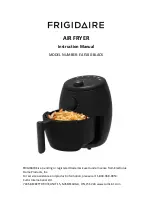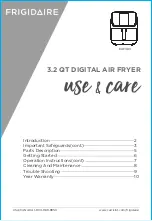
3
FOR YOUR SAFETY
1. DO NOT USE OR STORE PETROL OR OTHER FLAMMABLE MATERIALS IN THIS APPLIANCE OR
NEAR THIS APPLIANCE.
2. DO NOT SPRAY AEROSOLS IN THE VICINITY OF THIS APPLIANCE WHILE IT IS IN OPERATION.
3. DO NOT MODIFY THIS APPLIANCE.
n
Remove all objects from pockets, such as lighters and
matches, before placing items in the dryer.
n
Before the dryer is removed from service or discarded,
remove the doors to the drying compartment.
n
Do not reach into the dryer if the drum is moving.
A door switch is fitted for your safety.
n
Do not install or store the dryer where it will be exposed
to the weather.
n
Do not tamper with controls.
n
Do not continue to use this appliance if it appears
to be faulty.
n
Do not repair or replace any part of the dryer or attempt
any maintenance unless specifically recommended in the
Use and Care Guide. Repairs and servicing should only
be carried out by competent service personnel.
n
Do not use fabric softeners or products to eliminate static
unless recommended by the manufacturer of the fabric
softener or product. Follow their instructions.
n
Clean dryer lint screen before or after each load.
Do not operate dryer without lint screen in place.
n
Keep area around the exhaust and inlet openings and
adjacent surrounding areas free from the accumulation
of lint, dust, and dirt.
n
The interior of the dryer and exhaust vent should be
cleaned periodically by qualified service personnel.
n
See “Electrical Requirements” for earthing instructions.
n
Do not dry unwashed items in this dryer.
n
The final part of a tumble dryer cycle occurs without heat
(cool down cycle) to ensure that the items are left at a
temperature that ensures the items will not be damaged.
n
Items such as foam rubber (latex foam), shower caps,
waterproof textiles, rubber backed articles, and clothes
or pillows fitted with foam rubber pads must only be dried
on a clothesline.
n
If the supply cord is damaged, it must be replaced by the
manufacturer or its service agent or a similarly qualified
person in order to avoid a hazard.
WARNING:
Never stop a tumble dryer cycle before the
end of the drying cycle unless all items are quickly removed
and spread out so that the heat is dissipated.
IMPORTANT SAFETY INSTRUCTIONS
WARNING:
To reduce the risk of fire, electric shock, or injury to persons when using the dryer, follow basic precautions,
including the following:
SAVE THESE INSTRUCTIONS
n
Read all instructions before using the dryer.
n
Keep a minimum clearance of 100 mm (4 in.) between
the rear of the dryer and any wall.
n
The operation of this appliance may affect the operation
of other types of appliances which take their air supply
for safe combustion from the same room. There has to
be adequate ventilation to replace exhausted air and
thus avoid the back-flow of gases into the room from
appliances burning other fuels, including open fires,
when operating the tumble dryer. If in doubt, consult
the appliance manufacturers.
n
Do not obstruct the air supply to the dryer (see
Installation Instructions for minimum clearances).
n
Do not place items exposed to cooking oils in your dryer.
Oil-affected items can ignite spontaneously, especially
when exposed to heat sources such as in a tumble dryer.
The items become warm causing an oxidation reaction in
the oil. Oxidation creates heat. If the heat cannot escape,
the items can become hot enough to catch fire. Piling,
stacking or storing oil-affected items can prevent heat
from escaping and so create a fire hazard.
n
If it is unavoidable to dry in the dryer items that have
been soiled with substances such as cooking oil,
acetone, alcohol, petrol, kerosene, spot removers,
turpentine, waxes and wax removers, or that have
been contaminated by hair care products, they should be
washed in hot water with an extra amount of detergent
before being dried in the dryer. These items may give off
vapours that could ignite or explode. Such washing will
reduce, but not eliminate, the hazard.
n
This appliance is not intended for use by persons
(including children under 8 years of age) with reduced
physical, sensory or mental capabilities, or lack of
experience and knowledge, unless they have been
given supervision or instructions concerning use of
the appliance by persons responsible for their safety.
n
Cleaning and user maintenance by children must be
supervised.
n
Children should be supervised to ensure that they do not
play with the appliance.
n
Children less than 3 years of age should be kept away
from the appliance unless continuously supervised.
n
The dryer should not be used if industrial chemicals have
been used for cleaning.
4
IMPORTANT SAFETY INSTRUCTIONS
precautions, including the following:
WARNING:
Read all instructions before using the dryer.
Keep a minimum clearance of 100 mm (4 in.) between the
rear of the dryer and any wall.
The operation of this appliance may affect the operation of
other types of appliances which take their air supply for safe
combustion from the same room. There has to be adequate
ventilation to replace exhausted air and thus avoid the
back-flow of gases into the room from appliances burning
other fuels, including open fires, when operating the tumble
dryer. If in doubt, consult the appliance manufacturers.
Do not obstruct the air supply to the dryer (see Installation
Instructions for minimum clearances).
Do not place items exposed to cooking oils in your dryer.
Oil-affected items can ignite spontaneously, especially when
exposed to heat sources such as in a tumble dryer. The
items become warm causing an oxidation reaction in the oil.
Oxidation creates heat. If the heat cannot escape, the items
can become hot enough to catch fire. Piling, stacking or
storing oil-affected items can prevent heat from escaping
and so create a fire hazard.
If it is unavoidable to dry in the dryer items that have been
soiled with substances such as cooking oil, acetone, alcohol,
petrol, kerosene, spot removers, turpentine, waxes and wax
removers, or that have been contaminated by hair care
products, should be washed in hot water with an extra
amount of detergent before being dried in the dryer. These
items may give off vapours that could ignite or explode. Such
washing will reduce, but not eliminate, the hazard.
This appliance is not intended for use by persons (including
children) with reduced physical, sensory or mental
capabilities, or lack of experience and knowledge, unless
they have been given supervision or instructions concerning
use of the appliance by persons responsible for their safety.
Children should be supervised to ensure that they do not
play with the appliance.
The dryer should not be used if industrial chemicals have
been used for cleaning.
Before the dryer is removed from service or discarded,
remove the doors to the drying compartment.
Do not reach into the dryer if the drum is moving. A door
switch is fitted for your safety.
Do not install or store the dryer where it will be exposed
to the weather.
Do not tamper with controls.
Do not continue to use this appliance if it appears to be
faulty.
Do not repair or replace any part of the dryer or attempt
any maintenance unless specifically recommended in this
Use and Care Guide. Repairs and servicing should only
be carried out by competent service personnel.
Do not use fabric softeners or products to eliminate static
unless recommended by the manufacturer of the fabric
softener or product. Follow their instructions.
Clean dryer lint screen before or after each load. Do not
operate dryer without lint screen in place.
Keep area around the exhaust and inlet openings and
adjacent surrounding areas free from the accumulation of
lint, dust, and dirt.
The interior of the dryer and exhaust vent should be
cleaned periodically by qualified service personnel.
See Installation Instructions for earthing instructions.
Do not dry unwashed items in this dryer.
Items such as foam rubber (latex foam), shower caps,
waterproof textiles, rubber backed articles and clothes or
pillows fitted with foam rubber pads must only be dried
on a clothesline.
SAVE THESE INSTRUCTIONS
WARNING:
Never stop a tumble dryer cycle before the
end of the drying cycle unless all items are quickly removed
and spread out so that the heat is dissipated.
To reduce the risk of fire, electric shock, or injury to persons when using the dryer, follow basic
The final part of a tumble dryer cycle occurs without heat
(cool down cycle) to ensure that the items are left at a
temperature that ensures the items will not be damaged.
If the supply cord is damaged, it must be replaced by the
manufacturer or its service agent or a similarly qualified
person in order to avoid a hazard.




































